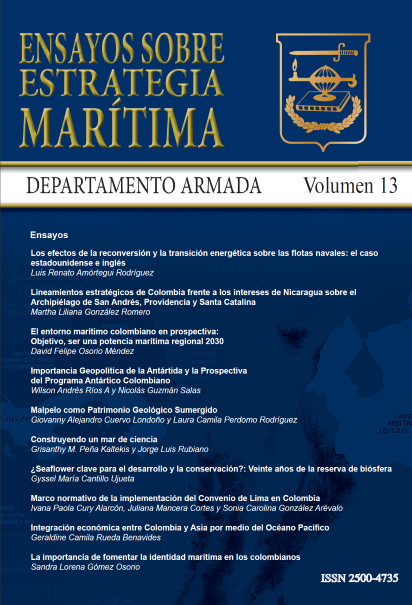Los efectos de la reconversión y la transición energética sobre las flotas navales: el caso estadounidense e inglés
DOI:
https://doi.org/10.25062/2500-4735.2317Keywords:
Energy transition, energy conversion, United States naval fleet, Royal English Navy, renewable energy, alternative energy, nuclear propulsion, national interests, energy security, coal, oil, fossil fuelAbstract
This article raises how the transition from coal to oil in the US fleet and the Royal English Navy at the beginning of the 20th century, was an operational decision with an impact on national interests and energy security, which presented challenges to these countries to ensure the supply of this fossil fuel, leading to the creation of the United States naval strategic oil reserves and the acquisition of the Anglo Persian Oil Company by the English government; Likewise, like the initial studies and the final decisions on the reconversion, they are parallel with the birth and the take-off of the oil industry in the United States. To continue with the use of nuclear propulsion in submarines as precursors for its implementation in aircraft carriers, due to the large volumes of energy required in the fulfillment of its mission and finally, the actions that the US Navy has been carrying out as a consequence of the transition towards alternative energies.
Author Biography
Luis Renato Amórtegui Rodríguez, Universidad Complutense de Madrid
Magíster en Estrategia y Geopolítica de la Escuela Superior de Guerra “General Rafael Reyes Prieto”. Magister en Administración de Negocios – MBA de la Universidad de los Andes. Magister en Planificación y Administración del Desarrollo Regional de la Universidad de los Andes. Economista de la Pontificia Universidad Javeriana. Becario del Center for Hemispheric Defense Studies “William Perry” en Washington, D.C. Doctorando en Relaciones Internacionales de Universidad Complutense de Madrid. Veintitrés años de experiencia en la industria petrolera en temas de planeación financiera, evaluación financiera de proyectos y estructuración de negocios.
References
American Oil and Gas (2018). Petroleum and Sea Power. Recuperado de https://aoghs.org/petroleum-in-war/petroleum-and-sea-power/
Atlantic Council Global Energy Center (2021). A clean energy agenda for the US Department of Defense. 14 de enero. Recuperado de https://www.atlanticcouncil.org/blogs/energysource/a-cleanenergy-agenda-for-the-us-department-of-defense/
Atlantic Council Global Energy Center (2020). National security and the energy transition: Why US leadership matters. 29 de julio. Recuperado de https://www.atlanticcouncil.org/event/national-security-and-the-clean-energy-transition-why-us-leadership-matters/
Dalh, Erik J. (2014). Naval innovations: from coal to oil. Join Force Quarterly (JFQ), Winter 2000-01. National Defense University. Washington, D.C.
De Espona, José Rafael (2013). El moderno concepto integrado de seguridad energética. Instituto Español de Estudios Estratégicos. Documento Opinión.
Department of Defense (2012). Operational energy strategy; implementation plan. Department of Defense. Washington, D.C.
Farr Courbis, Raúl (1984). El submarino de propulsión nuclear. Recuperado de https://revistamarina.cl/revistas/1984/5/farr.pdf
Hacker, Barton C (2005). The Machines of War: Western Military Technology 1850–2000. History & Technology. Sep2005, Vol. 21 Issue 3, p255-300. 46p. https://doi.org/10.1080/07341510500198669
Herrero de Castro, Rubén (2020). El concepto de interés nacional. Recuperado de https://dialnet.unirioja.es/descarga/articulo/4547890.pdf
International Renewable Energy Agency (2020). Energy transition. Recuperado de http://www.irena.org/energytransition
Keeter, Hunter (2003). Submarine, Carrier Nuclear Power Design Alliance Supports CVN-21 Development. Defense Daily; Potomac Tomo 218, N.º 17, (Apr 23, 2003): 1.
Paret, Peter (1992). Creadores de la Estrategia Moderna: Desde Maquiavelo a la Era Nuclear. V.A. Impresores, S.A. Madrid.
Pascual, Carlos y Elkind, Jonathan (2010). Energy security: economics, politics and strategies, and implications. Brookings Institution Press. Washington, D.C.
Reyes, Carla (2019). Breve historia de los barcos a vapor. Recuperado de http://ships.com.ar/breve-historia-de-los-barcos-a-vapor/
Roberts, Paul (2004). El fin del petróleo. Ediciones B., Barcelona. Grupo de Energía, Economía y Dinámica de Sistemas.
Sampson, Anthony (1975). Las siete hermanas. Las grandes compañías petroleras y el mundo que han creado. Grijalbo, Barcelona.
Tertzakian, Peter (2007). A Thousand Barrels a Second: The Coming Oil Break Point and the Challenges Facing an Energy Dependent World. McGraw-Hill Education, New York.
U.S. Department of the Navy (2010). Energy Program for Security and Independence. Department of the Navy. Washington, D.C. Recuperado de https://www.secnav.navy.mil/eie/ASN%20EIE%20Policy/Naval_Energy_Strategic_Roadmap.pdf
U.S. Department of the Navy (2017). U.S. Navy program guide 2017. Department of the Navy. Washington, D.C. Recuperado de https://apps.dtic.mil/dtic/tr/fulltext/u2/1026945.pdf
U.S. Energy Information Administration (2014). Biofuels are included in latest U.S. Navy fuel procurement. Recuperado de https://www.eia.gov/todayinenergy/detail.php?id=17271
Verdugo Soenksen, Santiago (1988). Submarinos convencionales y de propulsión nuclear. Recuperado de https://revistamarina.cl/revistas/1988/1/verdugo.pdf
Woody, Christopher (2018). These are the 10 biggest navies in the world. Recuperado de https://www.businessinsider.com/biggest-navies-in-the-world-2018-4
Yergin, Daniel (1990). The Prize: The Epic Quest for Oil, Money, and Power. Simon & Schuster. New York.
How to Cite
Downloads
Downloads
Published
Issue
Section
License
Copyright (c) 2023 Ensayos sobre Estrategia Marítima

This work is licensed under a Creative Commons Attribution-NonCommercial-NoDerivatives 4.0 International License.

| Article metrics | |
|---|---|
| Abstract views | |
| Galley vies | |
| PDF Views | |
| HTML views | |
| Other views | |
















